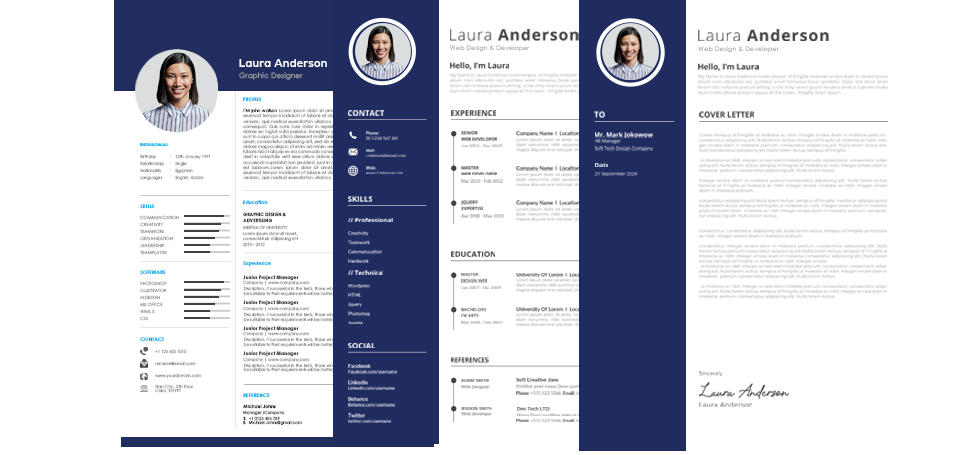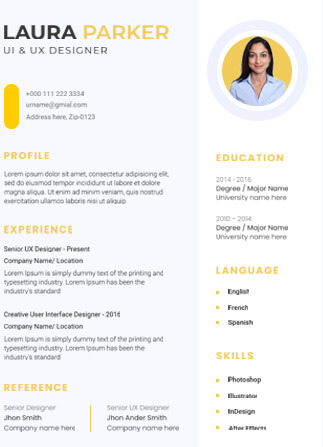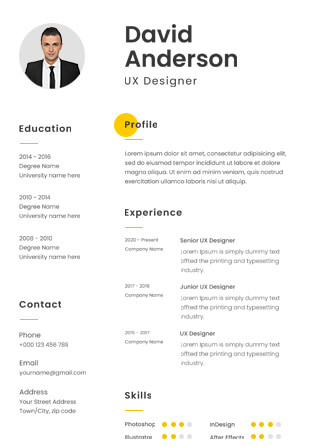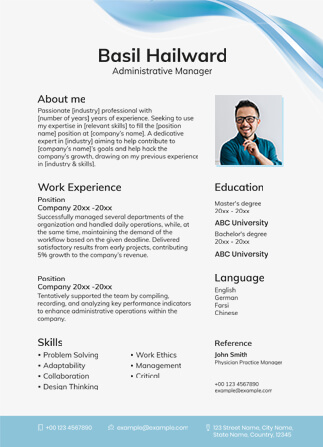Let Your Academic Achievements Shine Getting a Professional Academic Resume Examples
Your academic achievements culminate years of hard work and dedication and deserve to be showcased in the best possible light. So let your academic achievements shine with well-crafted academic resume examples, and take control of your future today!

Take your Academic Career to the Next Level with a Carefully-Designed Academic Resume
With a suitable academic resume example, you can highlight your accomplishments and make a powerful impression on potential employers, whether you’re a recent graduate looking to break into the workforce or an experienced professional seeking new opportunities. The right resume format can help you stand out from the crowd and demonstrate your expertise and achievements to the world.

Here we will discuss how you can build the perfect education resume format for yourself:
- What are the key components of an academic resume?
- What are the features of a professional academic resume summary?
- What keywords should you use in your academic resume summary
- How to choose the best format for an academic resume?
What Are the Key Components of an Academic Resume?
An academic resume is typically used when applying for teaching positions in schools, colleges, and universities. The critical components of an academic resume are:
Contact Information
In this section, you can include the candidate’s name, address, phone number, and email address. It should be displayed prominently at the top of the resume.
Summary
This is a brief statement that outlines your career goals. It should be specific, concise, and focused on the job the candidate is applying for.
Education
List all of the candidate’s educational degrees and certifications. It should include the name of the institution, the date of graduation, and the degree earned. This should also include relevant courses, essential grades, etc.
Teaching Experience
For an academic resume, highlighting your teaching experience, including the number of years worked, the type of classes taught, and the level of students taught, is important. Also, include a brief description of your teaching style and any notable achievements.
Professional Development
This section should list any professional development workshops, conferences, or training sessions the candidate has attended. It should also include any certifications or awards received for professional development.
Additional Information
Candidates may include additional information relevant to their teaching experience and qualifications in this section. This may consist of volunteering or community service work, publications, or membership in professional organizations.

How to Choose the best format for an academic resume?
You can choose any of the below options. However, reverse chronological is the most recommended method for academic resumes.
- Reverse Chronological Format: The reverse chronological format organizes information in which the most recent event or experience is listed first, and the older events or experiences are listed in descending order. This format is often used in resumes, personal statements, and biographies. It allows the reader to quickly understand the individual’s most recent experiences and skills, which are the most relevant to their current or desired career.
- Functional Format: This format focuses on your skills and achievements rather than your educational history. It can be helpful for those who have gaps in their education or who want to highlight specific skills they acquired during their education.
- Combination Format: This format combines reverse chronological and functional elements. It lists your education history and skills in a balanced manner. This format is best for those with a strong education history and skills that complement each other.
Ultimately, the format you choose should highlight your strengths, achievements, and skills clearly and concisely. Consider your recruiter and the type of education or job you seek when selecting.
What are the Features of a Professional Academic Resume summary?
Choose the Right Style
You can select from a few distinct summary formats, each with a unique focus and benefit for hiring managers who view your resume. For instance, the most typical format for resume summaries is a paragraph; nevertheless, you can include something more distinctive. You should include your occupation, job title, personal goal statement, and qualifications for the position in your segmented resume summary. Another summary format is the bullet list, where you list three to four of the most crucial elements of your resume, like your education, experience, and talents.
Always Write in Active Voice
When introducing yourself in your resume summary, use action words and an engaging voice. By using active voice, employers can see your abilities and determine whether you fit the job well. Employers are more likely to stay on your resume for longer if you use action words. Use verbs like “engaged,” “developed,” “implemented,” and “innovated,” as well as other expressions that demonstrate your capacity to produce good results, demonstrate your ability to take the initiative, help your pupils, and succeed.
Incorporate the Most Prominent Details
Keep your resume summary concise and limit your inclusions to information pertinent to the position you are looking for. For instance, if you are applying for a position as a kindergarten teacher, highlight solely the credentials that demonstrate your capacity to oversee and educate children in this age group. Also, consider the job description to add pertinent qualifications and stand out to companies. Keeping your resume summary concise can make it simpler for companies to assess your qualifications and suitability for the position.
What Keywords Should You Use in Your Academic Resume?
Keywords are one of the most crucial parts of every resume. However, every resume has its own keyword according to its niche.
Tips to Choose Keywords for Academic Resume:
Be specific:
Add keywords and phrases that are as closely relevant to the particular position you are applying for. It is more important to use specific and concentrated keywords. This increases the detecting chances of resume detectors.
Use Multiple Keywords:
To optimize your resume, you should use relevant keywords multiple times, but naturally.
Mix up the Keywords:
Using a wide range of keywords, you can demonstrate that you have all the varied attributes required for the position.
These are some keywords that should be used in an academic resume:
Teaching experience, Curriculum development, Classroom management, Student engagement, Assessment and evaluation, Professional development, Instructional technology, Collaborative teaching, Differentiated instruction, Student support services, Project-based learning, Interdisciplinary teaching, Science, Technology, Engineering, and Mathematics (STEM) education, Multi-sensory instruction, Behavior management, Inclusive education, English as a Second Language (ESL) instruction, Cultural competence, Lesson planning, Learning objectives
Unbeatable Resume Options with Unmatchable Quality
Discover the most effective and professional resume examples to help you stand out from the competition and land your dream job.
Quick Questions
An academic resume focuses on an individual’s education, training, certifications, and relevant work experience.
Your education should be listed in reverse chronological order, starting with the most recent degree or certificate earned. Include the institution’s name, graduation date, and degree or certificate made.
If you have relevant work experience, it can be listed under the education section or in a separate section labeled “Work Experience.” Be sure to list the company name, job title, dates of employment, and a brief description of your responsibilities and accomplishments.
You can highlight your skills in a separate section labeled “Skills.” List any relevant technical skills, such as proficiency in software programs, and soft skills, such as assertive communication and interpersonal skills.
It is optional to include references on your resume. However, it would be best if you were prepared to provide references upon request during the interview process.








